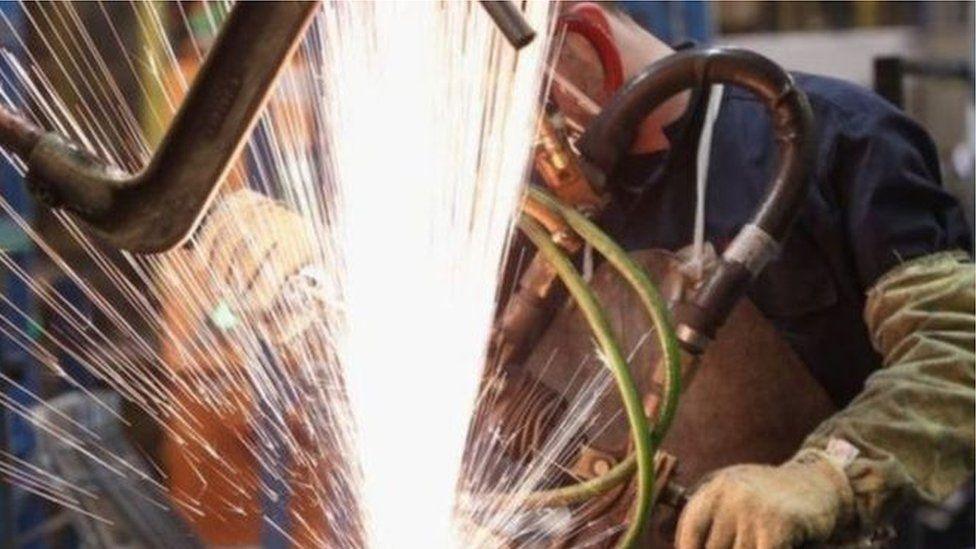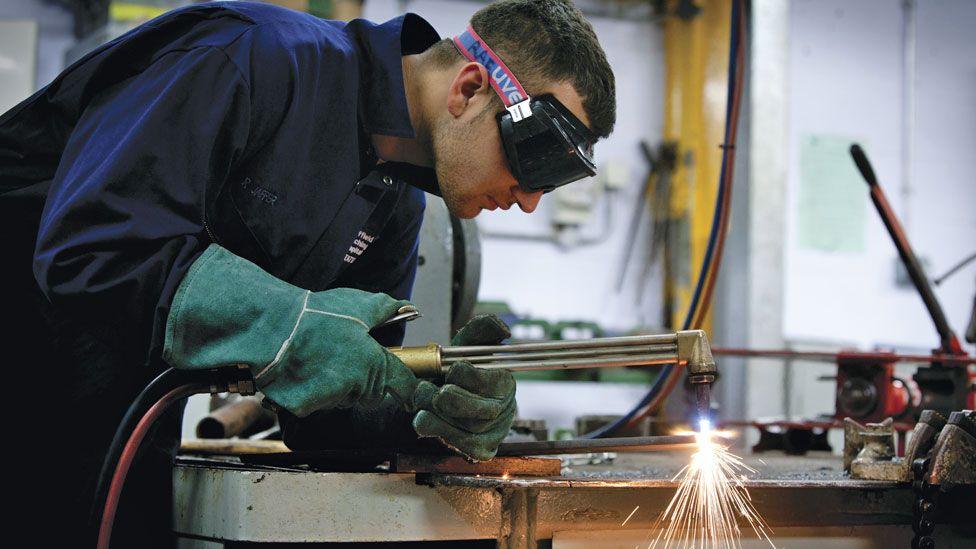Vocational qualifications: 'Societal stigma putting young people off'
- Published
- comments

Research found some sixth form pupils did not value vocational qualifications due to the "culturally perpetuated stigma of failing to get into university"
There is still a "societal stigma" stopping some young people taking vocational qualifications instead of a university degree.
That is one of the key findings of research commissioned by the Department for the Economy (DfE).
It suggested that for some, there was a "culturally perpetuated stigma of failing to get into university".
That meant study in a further education (FE) college was often seen as a "plan B" compared to going to university.
The just-published research was into perceptions of Level 4 and 5 qualifications in Northern Ireland.
Level 4 and 5 qualifications sit in between A-Levels and an undergraduate degree.
They include things like apprenticeships, Higher National Diplomas (HNDs), professional qualifications, and National Vocational Qualifications (NVQs).
Many are taught in FE colleges although some are taught in universities.
'Preference for university study'
A record proportion of school leavers in Northern Ireland have entered university during the past two years.
But there has also been a significant fall in the number of school leavers entering FE colleges.
A recent Stormont strategy for 14-to-19 year olds in education called for more "parity of esteem" between academic and more technical or vocational qualifications for young people.
But the new research found that some sixth-form pupils did not value vocational qualifications as much as university education.
The report said that there was still a "widespread preference for university-based study (over FE) and an enduring stigma surrounding vocational education and training more generally".

A record proportion of school leavers in Northern Ireland have entered university during the past two years
"This less favourable comparison and inevitable societal stigma appears to be reinforced both at school, by peers and teachers and at home by family or parents," it said.
A number of comments made by contributors to the research reflect this.
"When you mention the word apprentice, or anything other than an A-Level or university to a parent, you just see their face saying you think their child is a failure," one teacher said.
"Too many people in Northern Ireland still believe only the A-levels-to-degrees route is acceptable, which is a very 20th Century view and totally fails to take account of the changed and changing educational and work landscapes of the 21st Century," another teacher said.
An agri-food employer, meanwhile, said that there was still an "academic snobbery" among some in his business about vocational qualifications.
"Several interview participants spoke of the need to shift attitudes, to market the positive outcomes from vocational qualifications and to promote the value of alternative routes from school to employment," the report said.
'University bias'
The research also found that school careers advice to pupils about taking vocational or technical qualifications was inconsistent.
"At its worst, there was a perception among some participants that certain schools actively discourage or even 'block' FE colleges from coming in to speak to their pupils, which perpetuates the sense of 'otherness' associated with vocational qualifications," the report said.
As a result "there is, for many, poor understanding and awareness of Level 4 and 5 qualifications", it noted.
"School pupils (from both grammar and non-grammar schools) noted a strong university bias in their career planning sessions."

The Department for the Economy report suggested many students who took vocational qualifications valued the combined practical experience, work and learning
The report therefore recommended "more consistent careers information" in schools about Level 4 and 5 vocational qualifications.
More positively, it suggested that many students who took vocational qualifications valued the fact they combined practical experience, work and learning.
Some employers also said that students who had taken those qualifications were more ready to "get their sleeves rolled up" and work harder than some graduates.
The report said there was a need, however, for a website which contained information on and allowed students to apply for all vocational courses in the same way that pupils applied for university through UCAS.
The Department for the Economy report was based on the views of almost 600 sixth formers, students in FE colleges, parents and teachers as well as smaller numbers of focus group interviews.
The research was carried out and the report written by academics from the Centre for Research in Educational Underachievement at Stranmillis University College, Belfast from January to May 2022.